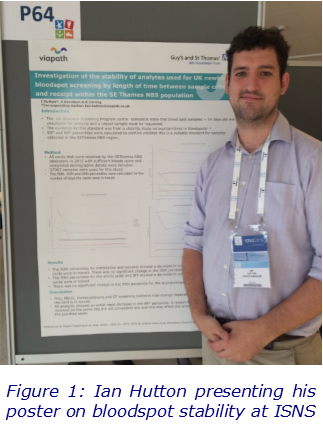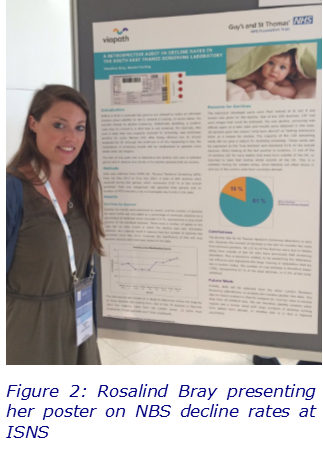Conference Update from Viapath’s Rosalind Bray and Ian Hutton at The International Society for Neonatal Screening
The International Society for Neonatal Screening (ISNS) aims to advance screening for neonatal and infant disorders, enhancing the quality of testing and medical services through dissemination of information, guidelines and best practices to help to ensure protection of babies from life-quality threatening conditions.
This year the ISNS Conference was held in The Hague, Netherlands, and as usual a huge array of topics were covered including the Wilson and Junger screening criteria (which were first published in 1968), bloodspot quality and worldwide screening programmes.
It was a privilege to hear Wilson and Junger’s own children speaking and the first session addressed whether the screening criteria are still fit for purpose in the modern day, particularly with recent advances in genetic screening. Discussion centred on the international differences in evaluation criteria for the inclusion of screening programmes, with the UK currently screening for 9 conditions (including cystic fibrosis and sickle cell anaemia) but some US states screening for 50.
How is Newborn Screening (NBS) Evolving in Developing Countries
Interesting examples of NBS programmes in developing countries included:
- - Screening across the Philippines, which has more than 7000 islands, has seen significant developments over the last twelve years. They currently have 5 screening laboratories with follow-up clinics in 14 regions. Special emphasis was put on ensuring public awareness of the NBS programme, including a National NBS Week with information disseminated via TV adverts, on billboards, online and in newspapers. Although still challenging, especially with the number of home births occurring, coverage has increased significantly over the years with many hospitals achieving special recognition for screening more than 90% of babies in their area.
- - A Smartphone Thyroid Stimulating Hormone (TSH) point of care app, currently being trialled in China, enabling the measurement of TSH and provision of a result in real-time (as opposed to a 2-3 day wait). This could be a useful technique for collecting results on patients in remote, rural communities as if there is a problem, it can be managed immediately removing the difficulty of finding the child again.
- - The pilot Nepalese screening programme which currently involves flying samples between Nepal and Switzerland. This poses many issues, such as delayed transit, lack of education within Nepal itself and sustainability of the programme. However, it is hoped that the results of the pilot could help persuade the government to fund their own in-house programme in the future.
Why do Tandem Mass Spectrometry (MSMS) Screening Results Vary Between UK Screening Laboratories
Viapath’s Dr. Rachel Carling presented a talk on the variability of MSMS screening results between UK screening laboratories. Variability stems from the different methods used by NBS labs, commercial versus home brew kits and different models of MS. Rachel explained the efforts to try and harmonise laboratories, including using a common internal standard, by citing work that was made possible by an award from Viapath’s Innovation Fund. Other analytical discussions included the future of automated screening. There was special interest in new devices to collect samples, which can be linked with automated sample preparation. These devices could eliminate bloodspot cards and remove manual punching, potentially reducing punching errors and issues related to bloodspot card quality.
Why Patient Advocacy Groups are Valuable
The final session covered patient advocacy groups and patients’ influence on driving forward screening programmes. John Hall showed how parents of phenylketonuria (PKU) children pushed clinicians and laboratory scientists to discover ways to detect and screen for PKU. John highlighted how the persistence of these parents helped to ensure a screening programme for PKU was started.
Advocacy groups continue to be an important part of decision making and with screening programmes continuing to expand across the world, it is important that their voices are heard.
Viapath’s Posters on Newborn Screening:
For further information contact ian [dot] hutton [at] viapath [dot] co [dot] uk or Rosalind [dot] bray [at] viapath [dot] co [dot] uk



